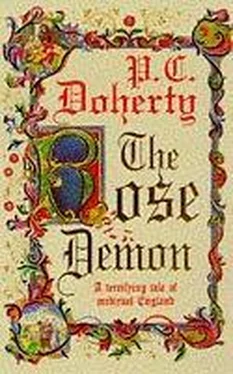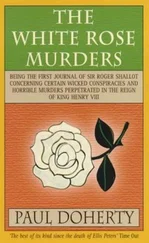Paul Doherty - The Rose Demon
Здесь есть возможность читать онлайн «Paul Doherty - The Rose Demon» весь текст электронной книги совершенно бесплатно (целиком полную версию без сокращений). В некоторых случаях можно слушать аудио, скачать через торрент в формате fb2 и присутствует краткое содержание. Жанр: Исторический детектив, на английском языке. Описание произведения, (предисловие) а так же отзывы посетителей доступны на портале библиотеки ЛибКат.
- Название:The Rose Demon
- Автор:
- Жанр:
- Год:неизвестен
- ISBN:нет данных
- Рейтинг книги:5 / 5. Голосов: 1
-
Избранное:Добавить в избранное
- Отзывы:
-
Ваша оценка:
- 100
- 1
- 2
- 3
- 4
- 5
The Rose Demon: краткое содержание, описание и аннотация
Предлагаем к чтению аннотацию, описание, краткое содержание или предисловие (зависит от того, что написал сам автор книги «The Rose Demon»). Если вы не нашли необходимую информацию о книге — напишите в комментариях, мы постараемся отыскать её.
The Rose Demon — читать онлайн бесплатно полную книгу (весь текст) целиком
Ниже представлен текст книги, разбитый по страницам. Система сохранения места последней прочитанной страницы, позволяет с удобством читать онлайн бесплатно книгу «The Rose Demon», без необходимости каждый раз заново искать на чём Вы остановились. Поставьте закладку, и сможете в любой момент перейти на страницу, на которой закончили чтение.
Интервал:
Закладка:
And then it was over. The clerk still sat on his horse, face sweating, chest heaving, his sword covered in blood from tip to hilt. Five of the outlaws lay dead; one knelt whimpering, still holding his face. Another groaned in agony, twisting on the ground. The clerk nudged his horse towards them. Twice his sword was lifted, coming down in cutting scythes and the two surviving outlaws died. Rahere dismounted. He cleaned his sword on one of the outlaw’s cloaks, took a water bottle from his saddle horn and splashed his hands and face. He then inspected the horses.
‘They are fine,’ he called over his shoulder. ‘They are trained for war, Matthias. Notice how the sumpter pony stayed stock-still and how the destrier fought like a warrior.’
Rahere picked up his sword where he had placed it against a corpse, resheathed it and walked along the trackway. He pulled the small, red ribbon from his hair, shook his hair loose around his face like Matthias had seen Christina do. Then he took a comb from his wallet and began to comb his hair, all the time staring at Matthias.
‘A bloody day’s work, eh?’
The boy just stared at the corpses. It had happened so quickly. One minute these were living men, dangerous, now they lay scattered about like hunks of meat.
‘Life and death,’ the clerk declared.
‘But they cut at you,’ Matthias said. ‘I saw them cut you with sword and dagger.’
‘You probably saved my life,’ Rahere replied. ‘They may have been after the horse but one of them, with a spark of kindness, balked at killing a child.’
‘They struck at you,’ Matthias repeated.
The clerk now retied his hair at the back of his head. He brushed the dust and stains from his cloak, jerkin and hose.
‘Two things, Matthias. First, if you strike at a man on a horse, your sword is going upwards: it loses a great deal of its force. Secondly,’ he threw his cloak over his shoulder and pulled up his jerkin. Matthias glimpsed the bright steel mesh beneath. ‘Milanese steel,’ the clerk explained. ‘Light as a feather but stronger than iron. Now come, boy. Let’s ride in triumph to your village. I’ll leave you at your house and then I’ll go to Baron Sanguis. I’ll tell our good lord to clear his forest paths.’
They continued on their journey. Only as they entered Sutton Courteny did Matthias remember the clerk’s words: ‘ Run like the wind! ’ That’s what the hermit had always said to him.
8
The Chronicler of Tewkesbury, when he came to describe the bloody and horrific events which occurred in Sutton Courteny around the Feast of All Saints 1471, noted that the beginning of the end was the Preacher’s trial in the nave of the parish church of Sutton Courteny on the feast of St Benedict. The proceedings were much different from the last time. Baron Sanguis sat enthroned in a chair placed just before the entrance to the rood screen. On his right, his grim-faced son, on his left Taldo the seneschal. In a corner, perched on a stool, quill in hand, one of his scribes. Before him a new jury had been empanelled.
The proceedings were dominated by Rahere the clerk. He stood, dressed in black from head to toe, a silver gilt war belt round his slim waist. The sword and dagger hanging there slapped threateningly against his thigh. On his black leather boots he had the affectation still to wear his spurs, which clinked and jingled at every step. The high-collared tunic with the white linen bands beneath came up just beneath his chin: his black oiled hair hung down to his shoulders. As he moved backwards and forwards, turning now and again to address Baron Sanguis, sometimes the jury, sometimes the crowd, they all watched fascinated. Matthias thought he was beautiful. The clerk reminded him of a black, languorous cat holding court over a group of mice. The women of the village gazed hot-eyed and whispered amongst themselves how this handsome young clerk from London had an eye for a pretty face and was already known for his sweet words. Rahere seemed to sense this. Like an actor in a play, he pitched his words and spun his web. At first he described himself, showing his commission on creamy-coloured parchment, the red wax still bearing clearly the imprint of the King’s Great Seal. He’d reproved the villagers for taking the law into their own hands and paused to allow Baron Sanguis to announce the fine. The villagers nodded. In the circumstances, they whispered, their manor lord was being compassionate. Matthias stared at his father, crouching in the same place he had during the previous trial, on the steps of the Lady Chapel. Parson Osbert had made an effort this morning to wash, shave and change his clothing though he still looked pale and woebegone.
Rahere the clerk now took up the story again, listing the dreadful deaths which had occurred in the area. He spoke in clear English, now and again lapsing into figures of speech common in the area. Matthias could tell Baron Sanguis and his son were fascinated. At last the clerk stopped speaking and jabbed a finger towards the corpse door.
‘In my view,’ he proclaimed, ‘the man we are about to confront is the true murderer: the spiller of innocent blood. Bring him in!’
Taldo got up and hurried to the door. A short while later the seneschal returned followed by Baron Sanguis’ burly bailiffs. The Preacher, his arms pinioned, was dragged between them into the church and forced to kneel facing the villagers. Matthias stared. Was this the man who had frightened him? The Preacher’s hair was tinged with grey, his hard face slack, globules of spit smeared the unkempt beard round his half-open mouth, his eyes were vacant as he gazed around. He was forced to kneel whilst Rahere summarised the accusations laid against him. When he came to answer, the Preacher could only shake his head.
‘I have been ill!’ he whimpered. His hands, released from their bonds, tapped either side of his head. ‘I cannot remember where I have been or what I have done. It’s as if I’ve been asleep.’
‘Do you deny the charges?’ Rahere asked crisply.
‘I don’t know who I am or where I have been.’ He coughed. ‘I have done ill, great evil.’
‘The man you condemned, the hermit, was innocent.’
‘Oh yes, oh yes, but I am confused.’
Rahere shrugged and glanced at Baron Sanguis.
‘What say ye?’
The Baron turned to the jurors.
‘Guilty!’ they chorused.
‘And the sentence?’ Rahere asked.
‘To be hanged on the common gallows!’ Baron Sanguis snapped. ‘Let his body be gibbeted as a warning to others who think they can come here and usurp my power!’
The villagers clapped and cheered.
‘Sentence to be carried out immediately!’ Baron Sanguis added.
The Preacher’s head went down. He started to sob. The jurors stood up, congratulating themselves. Matthias, squatting in the front, watched Rahere crouch down and drag back the Preacher’s head. He pushed his face only a few inches from that of the prisoner. Perhaps only Matthias heard the word ‘YOU!’ come from the Preacher’s lips before he dropped on all fours, head down like a dog.
Baron Sanguis’ bailiffs came forward. The prisoner was dragged out through the cemetery. A horse was waiting with a leather-covered sledge attached by wooden shafts. The Preacher was forced to lie on this. He was stripped naked except for his linen breeches, and the horse, its bridle held by Rahere, made its slow journey up the high street towards the waiting gallows. Parson Osbert stayed in the Lady Chapel, face in his hands.
Matthias decided to follow the crowd. They were throwing rubbish, dung and dirt at the Preacher stretched out on the makeshift sledge. The rutted tracks of the highroad scarred his back and made him scream in pain. At the Hungry Man Matthias stopped. He did not wish to go any further. Instead he stood on a table outside the tavern. The crowd reached the gallows. The Preacher was released, his hands lashed behind his back. The bailiffs pushed him up on to the horse. A noose was fitted round his neck.
Читать дальшеИнтервал:
Закладка:
Похожие книги на «The Rose Demon»
Представляем Вашему вниманию похожие книги на «The Rose Demon» списком для выбора. Мы отобрали схожую по названию и смыслу литературу в надежде предоставить читателям больше вариантов отыскать новые, интересные, ещё непрочитанные произведения.
Обсуждение, отзывы о книге «The Rose Demon» и просто собственные мнения читателей. Оставьте ваши комментарии, напишите, что Вы думаете о произведении, его смысле или главных героях. Укажите что конкретно понравилось, а что нет, и почему Вы так считаете.












